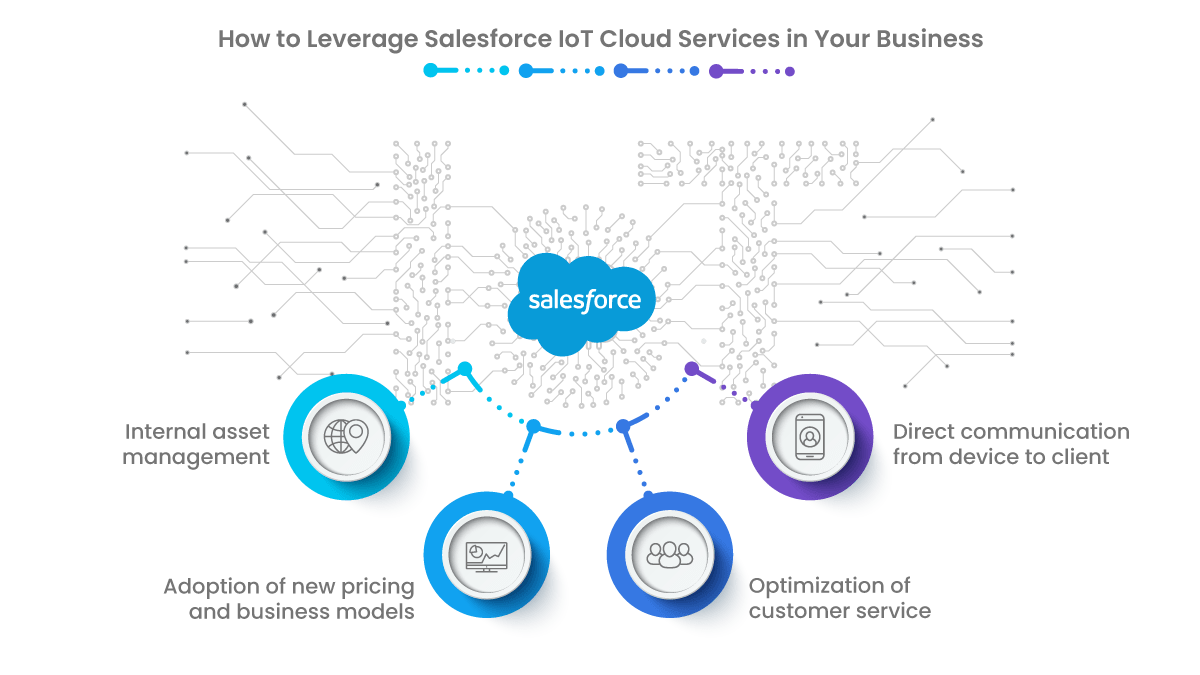Internet of Things (IoT) has become one of the most popular terms of the leading companies in the market in recent years. Why? Well, because IoT technology is strongly impacting the business world and expert leaders in customer services have realized its potential to optimize their business processes.
The Internet of Things is based on the interconnection of almost any everyday computer with the Internet, thus making it a smart device. This means that it has the ability to collect and exchange information with specialized software, achieving on-site data collection which provides endless opportunities for your company.
Salesforce IoT Cloud
Salesforce IoT Cloud is a powerful solution that allows you to connect data obtained from IoT devices with customer information in real time. In other words, it makes it possible to integrate any smart device into the daily business processes managed by Salesforce. This makes it possible to make alerts to clients based on the performance of the equipment, analyze the data obtained, and send commands to the devices directly from the platform. Likewise, the information collected passes to the marketing, service, and sales departments to act accordingly.

How has Internet of Things Impacted Business
The expansion of the Internet of Things opens up new windows of actions for the business world, allowing more accurate business decisions to be made.
From reactive and preventive to proactive and predictive
Salesforce Internet of Things services promote a shift in focus: from reactive to proactive and from preventive to predictive. How do we do this? Well, through connected IoT devices. These allow your business to jump from reactive breakdown repair services and periodic preventive maintenance plans to proactive monitoring and predictive maintenance.
Sensor data travels to an IoT platform where, using Artificial Intelligence (AI), it is analyzed to discover trends and predict which components may fail and when. IoT devices monitor criteria such as: asset age, voltage fluctuations, usage data, temperature, humidity, and much more. With the resulting data, equipment failures can be predicted with a very high level of precision and operating parameters can be optimized. But what do you do with this information? Well, this is where a CRM comes in to play its role.
Salesforce’s job is to contextualize and process high-value data. When piped into a CRM, this data can be leveraged to automate business processes that improve customer service. Analysis of IoT data by a CRM enables a more proactive approach that empowers service supervisors, agents, and field technicians. Thus, the field service can monitor the current status of the equipment and be proactive in emergencies or predictive to respond to current trends.
Additionally, by using IoT data, companies can develop more stable revenue and expense streams from maintenance contracts based on time of use rather than charging for sporadic repairs. By storing and processing this data, a company can estimate when a customer’s product will require maintenance and recommend a replacement or the sale of a specific part to prevent the collapse of the product. In other words, the company offers the ideal solution with the right replacement component at the right time. This maximizes the uptime of the equipment, results in fewer maintenance visits, reduces costs, and grants greater customer satisfaction where the customers’ trust and loyalty are improved.
How to Leverage Salesforce IoT Cloud Services in Your Business
There are a number of ways you can take advantage of Salesforce Internet of Things services for your business. These are some of them:

Internal asset management:
- Tracking of devices, machinery, and vehicles
- Sending commands and instructions to devices
- Supervision and monitoring of the useful life of the equipment
Adoption of new pricing and business models:
- Expanded context of the use of business products
- Optimization of business operations
- Making more accurate business decisions
- Personalization of products and services
- New and profitable usage models for products and services
- Discovery of the most successful business models
Optimization of customer service:
- Storage and comparison of data on the real state of a device
- Advanced alerts on the deviation of your optical parameters from a device
- Track device performance metrics
- Troubleshooting equipment remotely
Direct communication from device to client:
- Identification of usage patterns that most frequently damage equipment
- Notification to users about actions that negatively impact a team
- Save time for the support team
Conclusions
We are immersed in a growing ecosystem of connected devices. In our hands, we have the possibility of using this infinite sea of data to improve our lives. Many companies are witnessing the benefits of Salesforce CRM for managing customer relationships. Now, with its services related to the Internet of Things, much more value is added by collecting and processing continuous flows of information from all connected devices.
IoT technology has the potential to elevate field service to previously unsuspected levels. This does not mean that companies will become proactive and predictive in a short period of time, but the exchanging of IoT data with a CRM platform enables customer service to begin to evolve. At Skyplanner, we can help you implement your Salesforce IoT solution. Write to us at hello@theskyplanner.com.
